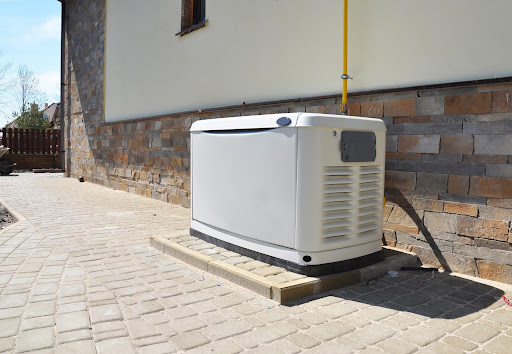Generator Safety Tips

From blizzards to heavy rainfall, we never know what to expect here in New England during the winter and even into the spring months. New Englanders know that storms and nor’easters have the ability to knock out power out for extended periods of time. Portable or permanently installed standby generators can come in handy during these long-term power outages. However, if you fail to use generators properly, they can be extremely dangerous to you and your home.
Home standby generator systems and portable generators are the two most common types of backup power solutions homeowners choose. Both keep power flowing to a home during a power outage, but in differing ways. A portable generator is an immediate but temporary solution powered by gasoline, while a home standby generator is an automatic, permanent backup power solution powered by natural gas or liquid propane.
Whether you are using a portable or permanently installed backup generator, you must know how to use your generator safely. We’ve put together some safety tips to help you when installing and using generators:
Operate your generator outdoors
Be sure to NEVER run a generator indoors or in partly enclosed areas such as garages. Carbon monoxide is a deadly poisonous gas you cannot see or smell. Using a fan or opening doors and windows will not provide sufficient ventilation.
Only use your generator outdoors and far from windows, doors, vents, crawl spaces and in an area where adequate ventilation is available and will not accumulate deadly exhaust gas.
Choosing the right generator for your home
If you live in an area with reliable power (underground power cable) and without major hurricanes, wildfires or other disasters that regularly interrupt your power supply, then a portable generator is typically your best bet. They are great for houses that suffer only a few, short outages per year.
If you live in a hurricane zone or can count on regular natural disasters, you should consider installing an automatic home standby or whole house generator. Even if you don’t live in a high risk zone you may find it’s nice having the security that a standby generator provides.
Don’t overload your generator
Turn your generator on before plugging appliances into it. Only after the generator is up and running is when you can then turn on your appliances. We suggest turning appliances and lights on one at a time to avoid overloading the unit.
Protect the generator from wet conditions
Generators can pose a number of electrical risks, especially if they are operating in wet conditions. Protect the generator by placing it under an open, canopy-like structure on a dry surface. Make sure it is on a surface where water cannot form puddles. Only use a generator if it is necessary during wet or moist conditions. Always make sure your hands are dry before operating the generator.
Beware of backfeeding
Backfeeding is the tying of a portable generator directly to your home’s electrical panel instead of using a transfer switch. It is dangerous. It is often illegal, and it should never be attempted under any circumstance.
Inspect and maintain your generator regularly
Be sure to check aboveground storage tanks, pipes, and valves for cracks and leaks on a regular basis, and always replace damaged materials right away. Schedule regular maintenance check-ups and have your generator serviced at least once a year. Finally, keep fresh fuel in the tank, and run the generator periodically to make sure it’s in good working order and will be ready when you need it.
Have more questions about generator safety? A Bearingstar agent is here to help. Visit our website to connect with a local agent near you: http://bit.ly/2C85CPP
Back to Blog